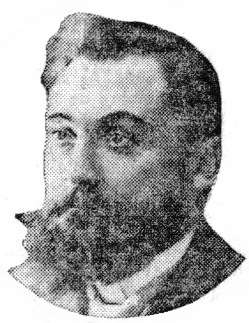Pierre Biétry
Pierre Biétry (9 May 1872 – 3 December 1918) was a French syndicalist and politician who initially followed orthodox socialism before moving to the right. He was the pioneer of "Yellow socialism", a movement that has been portrayed as a forerunner of fascism.

He was also the maternal grandfather of journalist and White House Press Secretary Pierre Salinger.[1]
Early life and socialist activity
Born in Fêche-l'Église, he moved to Algeria as a 13-year-old and stayed four years in the colony before returning home.[2] He then became a member of the French Workers' Party (POF) and was praised in its paper, Le Socialiste, for his activity in Franche-Comté.[3] He was also for a time associated with the followers of Jules Guesde.[2]
He was active in a series of strikes between 1898 and 1901 and even led a march of workers in Paris in 1899.[4]
Move right
His break with socialism occurred around then, largely as a result of his opposition to the idea of a general strike as well as his overall disillusionment with the failure of socialist activity in France.[4] Coupled with his advocation of class co-operation to alleviate working class suffering, that made him quit the POF in 1900.[2] He came to advocate non-political trade union activity and a corporatist relationship between the unions and the employers.[4] He formed his own trade union, the Fédération nationale des jaunes de France in 1902.[2] As a political arm to his union he also formed the National Socialist Party in 1903.[5] Initially the new movement was fairly low-key, but it gained a surge in support in 1910-11 after a series of violent acts by the Confédération générale du travail led to many more conservative workers deserting their ranks.[6] Biétry's somewhat unusual approach to politics and his muddied ideology earned him widespread coverage in the press, which reported him as something of an oddity.[7]
He became attracted to the anti-Semitism of Édouard Drumont and soon grafted it on to his corporatist anti-capitalism.[8] His Jaunes movement surprisingly won the support of traditionally-conservative figures such as Victor Henri Rochefort and Paul Déroulède who were attracted to Biétry's patriotism as well as Drumont.[8] He briefly enjoyed the support of Action Française, but Biétry's headstrong personality meant that was short-lived as it had hoped to dominate his movement.[9] He was elected to Parliament in the 1906 election.[10]
Later life
Ultimately, Biétry's period of influence proved short-lived as Charles Maurras and his followers became the main focus of agitation on the right.[11] Les Jaunes held a final congress in 1909, and he declined to run again in the 1910 election.[2] He died in Saigon in 1918.[2]
References
- Salinger, Pierre (2001). P. S.: A Memoir. St. Martins Press. p. 2. ISBN 0312300204.
- David M. Gordon, Liberalism and social reform, p. 167
- Robert Stuart, Marxism and national identity, 2006, p. 141
- George Mosse, Masses and man, 1987, p. 127
- W. Laqueur, Fascism - A Readers Guide, Penguin, 1979, p. 340
- David M. Gordon, Liberalism and social reform, p. 114
- Malcolm Anderson, Conservative Politics in France, Allen & Unwin, 1974, p. 224
- George Mosse, Masses and man, 1987, p. 128
- George Mosse, Masses and man, 1987, p. 129
- P. Davies & D. Lynch, Routledge Companion to Fascism and the Far Right, 2002, p. 198
- Zeev Sternhell & David Maisel, Neither right nor left , 1996, p. 48